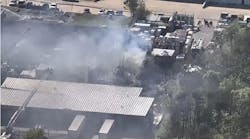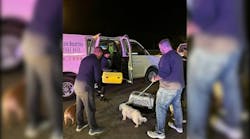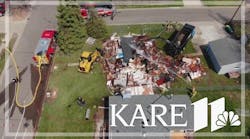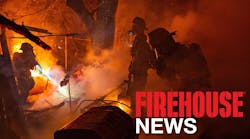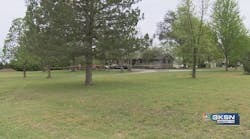In what would turn out to be one of this nation's most bitter and hard-fought fights between a private ambulance service and a fire department, the Lincoln Fire Department prevailed in the end. However, the road to improve services in Lincoln was laced with landmines, slick spots and roadblocks.
The battle started in 1993, when the fire department and Eastern Ambulance, Rural/Metro's predecessor, duked it out over the city's ambulance contract. The next year, Rural/Metro - the second-largest U.S. commercial for-profit ambulance provider - bought out Eastern Ambulance. Ironically, in 1992, a consultant's report recommended that the fire department take over EMS transport. The Lincoln Fire Department, however, had some hurdles to overcome prior to even thinking about EMS transport and paramedic engines. The first paramedic hired into the system in November 1994 was Bill Madison, who was appointed as the deputy chief of EMS. According to Madison, "It has been a true reward to see the system grow from 1994 to where we are now."
Jump to 1999. Don Wesley, Lincoln's new mayor, told City Council members that his office was negotiating with Rural/Metro on the renewal of its contract. He further told the council members that if it did not work out, the city would seek new bids on ambulance service. However, in the first part of 2000, the negotiations did break down and the mayor announced that the ambulance contract would go out for bid. The contract with Rural/Metro was due to expire on Jan. 1, 2001.
The plot thickens. With the contract set to expire, Lincoln firefighters made it known that they believe they could deliver superior service with more resources than the four ambulances Rural/Metro was dedicating to emergencies in the community. On the other side of the coin were those who did not want to see the fire department take over EMS.
One player who opposed the fire department was a City Council member who "carried the water" for Rural/Metro. Add the politicians, Rural/Metro and some businesspeople, and you have the makings of an interesting and bitter battle. The City Council member who supported Rural/Metro was Jon Camp. Early in the process, he tried to pass an ordinance through the City Council extending Rural/Metro's contract for two years beyond the Jan. 1, 2001, date. The council voted down his proposal by a 5-2 vote.
Add more players. If there were not enough players already lined up on different sides in this battle, another group entered the fray. Whenever a significant change may occur, egos get in the way and some people worry that they will lose some power. One such group was the Lancaster County Medical Society, which wanted medical oversight. The medical society was essentially a group of physicians, many of whom had no emergency medicine certification. Some of their reasoning for wanting control was so obtuse that they actually feared that the Lincoln Fire Department might try to use too many paramedics in the new system.
Too many paramedics?
The physicians tried to explain this non-intelligent statement by indicating the more paramedics, the less each paramedic gets to perform an advanced life support procedure - thus decreasing their skills. Fire Chief Mike Spadt obviously argued against this notion and Wesley wisely declined the society's proposal.
The ambulance contract was put out for the bid process in the spring of 2000. When the deadline arrived for ambulance bid submissions, three proposals were on the table. One each from Rural/Metro, the Lincoln Fire Department and Platte County Ambulance, which was interested only in the non-emergency service. All the information was sent to a review committee that would present a synopsis to the mayor.
After the proposals went public, the detractors of the fire department were in full force ripping into the fire department's proposal although it called for more assets for less money. Rural/Metro's proposal called for maintaining the status quo with a minimum of four crews 24 hours a day, seven days a week. In the meantime, the Lancaster Medical Society continued with its simple-minded argument that more is not better. The fire department proposal called for a workforce of 70 paramedics, but the physicians said only 25 to 30 paramedics were needed in the community.
In late May 2000, the physicians group let egos and political opinion affect patient care in the community. A proposal was put on the table to downgrade the Lincoln Fire Department paramedics who were operating from advanced life support engines to emergency medical technicians (EMTs), thus denying them the ability to perform advanced procedures.
In early June, the review committee submitted its analysis of the proposals to Wesley. After reviewing the report from the review committee, citing "better, faster, cheaper" service, the mayor chose the fire department and recommended that independent medical oversight of the new system continue with EMS Inc., an independent body already financed by the community to medically oversee the current system.
After Wesley chose the fire department, the debate heated up more with the City Council set to vote on the mayor's recommendation. Turning up the political fight, Rural/Metro mailed a letter to 2,700 subscription customers. It stated, "Rural/Metro is very concerned that the risky proposed government run ambulance service does not have documented plans to continue your ambulance service."
During that period, Rural/Metro was shutting down operations in other cities, losing executives and failing to meet debt obligations. Citizens who were outraged at the attempts to sway public opinion and supported the fire department proposal organized a group called Citizens for Outstanding Response in an Emergency (CORE). The group was not connected to the Lincoln firefighters, but believed the fire department had the best proposal.
After a six-hour heated debate before the City Council which included name-calling, finger-pointing, grandstanding, charges, countercharges and posturing, the council voted 4-3 in favor of the mayor's recommendation and the fire department's proposal. Councilman Jonathan Cook said, "Having a single integrated system under one umbrella makes the most sense."
But that was not the end of the controversy in Lincoln. A group of citizens, businesspeople and physicians who were unhappy with the City Council vote started a petition drive to halt the council's ambulance decision. The group, calling itself Supporters of Ambulance Value and Excellence (SAVE), was intent on putting an amendment on the ballot devising a new process for selecting an ambulance provider. Eventually, the group gained enough signatures to place the issue on the ballot for Nov. 7, 2000. In response, the CORE group that supported the firefighters changed its name to "Vote NO to Save Lives." Voting no meant you were against the city chart amendment devising a new process for selecting an ambulance provider.
Between the petition drive and the vote itself, the bitterness and rancor continued, with some physicians in the community still arguing that they should be in charge. But not all physicians in the community supported the views of the medical society. Many physicians supported the firefighters and some even held a press conference emphasizing their beliefs.
Leading up to the vote, a political campaign was waged by CORE (Vote No to Save Lives) and SAVE. Yard signs, TV commercials, mailings and speeches filled the days up to the election. On election night, with 100% of the precincts reporting, the firefighters and ultimately the citizens of Lincoln were victorious. The issue of who would provide EMS to the community was finally put to rest.
Effective Jan. 1, 2001, Lincoln firefighters are providing EMS treatment and transport. Lincoln now has an EMS system in which first response and EMS transport are coordinated under the same providers, equipment, training, administration and logistics system. Although there were many bumps and bruises along with the way, the Lincoln firefighters and their administration are to be complimented for their efforts and persistence in raising the standard of EMS provided in their community.
Gary Ludwig, MS, EMT-P, a Firehouse® Contributing editor, is the chief paramedic for the St. Louis Fire Department and is the vice chairman of the EMS Executive Board for the International Association of Fire Chiefs. He has lectured nationally and internationally on fire-based EMS topics and operates The Ludwig Group, a consulting firm specializing in EMS and fire issues. He can be reached at 314-752-1240 or via www.garyludwig.com